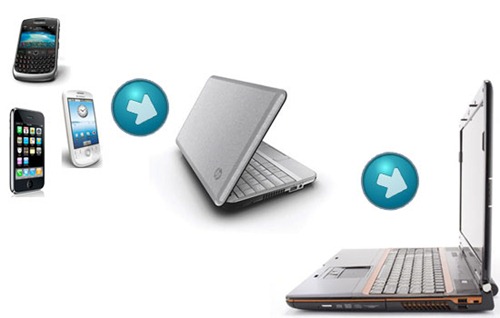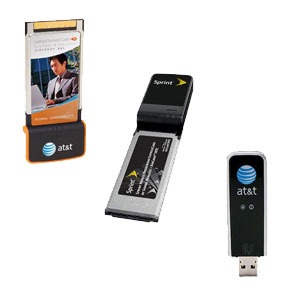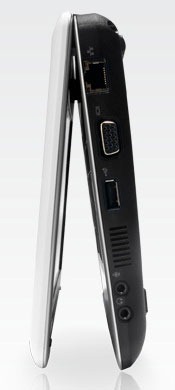Four words:
Convenient, Small, Dirt-Cheap.
If you’re the impulse shopper type, that’s all you need to know. Click below to go to the very bottom to find those ultra-light weight, dirt-cheap laptops.
If on the other hand you’re the kind that likes to know a bit about the car they’re about to entrust their life to before they drive it, keep reading. We’ll cover everything from the cradle to the grave.
Contents:
- Why Give A Damn?
- A Brief History on Mobile Computing
- How Do Mobile Broadband Netbooks Work?
- Should You Get One?
- Where Can You Get a Good Price?
See, mobile broadband netbooks are above all, supremely cheap, extremely portable, very convenient and light on processing power.
While they are not meant for ultra high end gaming or conducting research analysis, they are very important for the college student, businesswoman/man or knowledge worker on the go that primarily needs to write, research and communicate online.
To better illustrate, mobile broadband netbooks bridge the gap between powerful laptops and high end smartphones.
While you can get a lot done on a smartphone, you can still get a lot more done on a mobile broadband netbook. Naturally, a fully featured laptop would be able to handle more processing. For most everyday tasks however, a netbook is like Goldilocks porridge. It’s juuuust right.
There are tasks you can’t accomplish on a smartphone efficiently. For instance, certain flash/JavaScript components of web pages just don’t play nice with smartphones yet. Sometimes you need the full web experience with a decent sized screen to comfortably get stuff done.
On the flip side, you don’t necessarily want a chunky sized laptop that hurts your shoulder at the end of day.
Feeling 007ish? Many netbooks can be easily tucked away for convenient, unobtrusive safe-keeping
Believe me, I know. I had one of those 10 pounders for 3 years in undergrad. It was terrible. All I needed to do was just check some email, type a paper and maybe save a document or two. My phone certainly wasn’t going to let me chart Microsoft Excel spreadsheets.
A netbook would though.
Better yet, a 3G netbook would let me chart that spreadsheet and email it to my professor regardless of whether I was on campus to get my school’s WiFi or not.
Think about it, you could be chilling on the beach blasting off presentations and documents while YouTube loads in the background to play "Sail away, sail away, sail away" (by Enya)…all while you let that cool sea breeze hit your face and warm sand wrap your feet.
For now, let’s talk about what makes these lil guys tick, who’s it for and not for, as well as where you can get it cheap mobile broadband netbooks.
What Makes Mobile Broadband Netbooks Tick?
Before we get into how mobile broadband netbooks work, it’s important to know how and why we even got up to that point.
Broadband cards became the primary means of getting mobile broadband. They themselves evolved from PC Cards, to ExpressCards and now mostly USB cards (pictured from left to right).
If you spoke about mobile broadband 1 year ago, you’d have four options of getting online.
Three of those options would be a variation of a broadband card (PC Card, ExpressCard or USB card) while the other would be connecting your phone to your laptop to use its connection (also known as tethering).
That’s changed.
Recently, Novatel came up with the MiFi which has been dubbed as a personal hotspot.
To explain briefly, this credit card sized device grabs the 3G signal from cell phone towers and broadcasts it over 30 feet for any 5 WiFi enabled devices to connect.
This expands 3G service availability to not just a laptop or desktop, but phones, cameras and even digital WiFi photo-frames.
But wait, there’s more!
All while Novatel has been developing their technology, laptop manufacturers have been plotting on ways to get their market share of 3G services. The clever profit driven execs came up with an astonishingly convenient way for them and us. In addition to putting WiFi radios in laptops, they started embedding 3G radios that could be configured/locked for any major network just like cell phones.
That’s right ladies and gents, enter the world of mobile broadband netbooks.
How Do Mobile Broadband Netbooks Work?
Pictured above is the Dell Mini 9 Series. It’s tiny. Look at how large this guy’s fingers and cup are compared to the netbook. Quite the portable mobile broadband netbook.
The radio technology, manufactured by companies such as Qualcomm, can connect to either UMTS HSPA or CDMA2000 networks. For users in the United States, that means it can work with AT&T, T-Mobile, Verizon or Sprint (the latter two being CDMA2000 based for now).
Here’s where stuff gets interesting
Since laptop manufacturers such as Hewlett-Packard (HP) & Dell sell the mobile broadband netbooks (ultra-portable, but less powerful laptops), why would anyone buy a mobile broadband laptop from a cell phone company?
Deep discounts just like cell phones.
See, if you buy a 3G netbook from the manufacturer, it’s almost like buying a cell phone unlocked.
You can select whichever carrier you go with. However, if you buy a laptop from a cell phone company, it’s already going to be locked to that carrier. To buy your freedom & lock in your cash, they’ve got to give you some kind of incentive. For you, that means savings of anywhere from $100 to $300 off the price of the netbook.
But won’t they just make back their money?
Yes. They will.
Let’s be honest, they are a business. Like most businesses, their primary motivator is profit, not altruism.
Some opponents of contract-based mobile broadband netbooks argue that over the course of a regular $60/month 2-year contract, you’ll pay $1440.
Yes, you will.
However, if that was money you were going to be spending on an aircard/broadband device anyway, why not get a netbook out the deal? Let’s face it, a 3G netbook can do much more than a broadband card, MiFi device or smartphone can ever do. While all the previous devices mentioned are convenient, none of them can match the functionality of a ultra-portable computer.
Should You Get A Mobile Broadband Netbook?
Let’s talk about who 3G netbooks are for and who they are not for.
You Should Get a Mobile Broadband Netbook If:
You’re on the go a lot and like to stay connected anywhere a cell phone signal exists.
The upside to mobile broadband netbooks partnering with cell phone companies is that the networks are pretty much nationwide. For most places, if you can catch a cell phone signal you can also catch some 3G. Naturally, this isn’t an enchanted magical artifact. If you know you live in a ‘fringe’ area (read: far out there), you’ll want to double check coverage before you buy.
You plan to use it just for yourself and don’t need to share your connection.
While it’s possible to do so, it’s not the most efficient way. By creating an adhoc network, you’d only be able to share it with a close by computer. In addition to that, your netbook would always need to be on in order to do so. If you don’t mind that, Lesson 11 of Wireless Broadband Exposed shows you how to do that.
The kind of work/play/multi-tasking you need to do just can’t be done quick enough (or at all) on a smartphone.
You like email, you like communicating, you like getting stuff done quickly and efficiently. Netbooks are great for that. Smartphones have their limitations. You better believe you’re not getting up to 70 words per minute on an iPhone. You surely aren’t having multiple tabs open in a web browser either (yet). Besides, sometimes, you just want a full size keyboard you can press away on.
You don’t need a super-computer to get stuff done.
Netbooks are not built of ultra-powerful Nano machines able to hack into Bank of America, JP Morgan Chase and Citibank at the same time. They’re more like a notebook you’d use to keep track of your expenses through Quicken or Mint.com.
You do get what you pay for.
Think of your netbook as your weekend get-away sports car. It’s not your Hummer you’d drive through the swamp of heavy computational processing.
You wouldn’t mind upgrading for a cheap price to the latest and greatest netbook every 2 years when your contract is up.
Let’s face it, this is probably the most important point of all. Most laptops are ‘old’ by computing standards in 2 or 3 years. Having a cell phone company discount the purchase of a new one would be even better than trading in your car for the purchase of a new one.
Since they already discount smartphones by $300 or so, that kind of ‘upgrade’ deal on a laptop would be quite beneficial. Not only would you get that discount, you could resell the laptop on Craigslist or EBay to recoup even a bit more cash.
That’s not something you ever feasibly get to do with your cell phone. You can bet on that one.
With that being said, where can you get 3G netbooks and what kind of cash can you expect to shell out? Don’t worry, I’ve got your back.
Where Can You Get It Right Now For A Good Price?
The Short Answer: See our partner for a short list of the best mobile broadband netbook pricing.
The HP Mini 110 by AT&T is the best netbook based on design, build, price & mobile broadband options.
While there are a bevy of built-in mobile broadband laptops on the market, I’ve hand selected a few below and reviewed in depth each of them.
To be honest, right now the best of the lot is the HP Mini 110.
When it comes to design, portability, keyboard size, screen, mobile broadband options and even price, hands-down it is the mobile broadband netbook I would shell out cash for.
If you buy the HP Mini 110, it’ll support the site too.
Read on for the full reviews on any 3G netbook:
HP Mini 1151NR (Verizon)
 The HP Mini 1151NR is the successor to the HP 2133 Mini-note. Weighing in at 2.4 pounds it makes for very convenient travel partner.
The HP Mini 1151NR is the successor to the HP 2133 Mini-note. Weighing in at 2.4 pounds it makes for very convenient travel partner.
Like all HP Mini’s it boasts a 92% sized keyboard for extra comfy typing. Unfortunately, it’s glossy screen can be a hindrance to outdoor computing.
Nevertheless, throw in Verizon mobile broadband and you’ve got the nation’s ‘most reliable network’ on your team. Read on to find out what HP put under the hood of the 1151NR.
Compaq Mini 110 (AT&T)
 The Compaq Mini 110 is pretty much a rebranding of the HP Mini 110. For what purpose? I do not know. It’s got just about the same exact specs with a few differences.
The Compaq Mini 110 is pretty much a rebranding of the HP Mini 110. For what purpose? I do not know. It’s got just about the same exact specs with a few differences.
If you’re interested in the Compaq Mini, you might as well go for the HP Mini 110 since they’re made by the same company while the HP version has a few more tricks.
Read on for the details on the Compaq Mini 110.
HP Mini 110 (AT&T)
 The HP Mini 110 (1048NR) with AT&T mobile broadband is the successor to the HP Mini 1000 (1151NR).
The HP Mini 110 (1048NR) with AT&T mobile broadband is the successor to the HP Mini 1000 (1151NR).
Based on customer feedback, HP fixed a number of issues. Among the most notable was the glossy screen. Another nice step up is the 160 GB hard drive which is quite uncommon in the netbook category and should keep you packing media for quite a bit.
Also, another nice touch is the Syncables software that allows you to sync your files with a ‘host’ PC over your home’s wireless network. In other words, it’ll keep both computers up-to-date regardless of whichever one you work on automatically.
It also sports a matte/anti-glare screen that works better outdoors. Read on for the full details on the HP Mini 110-1048NR.
Need more info? Check out the rest of the mobile broadband reviews.







